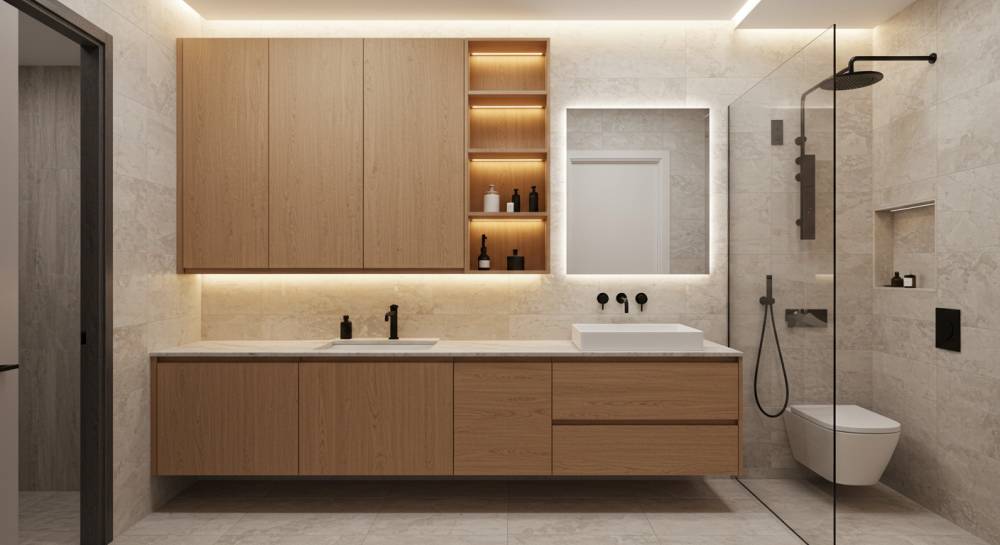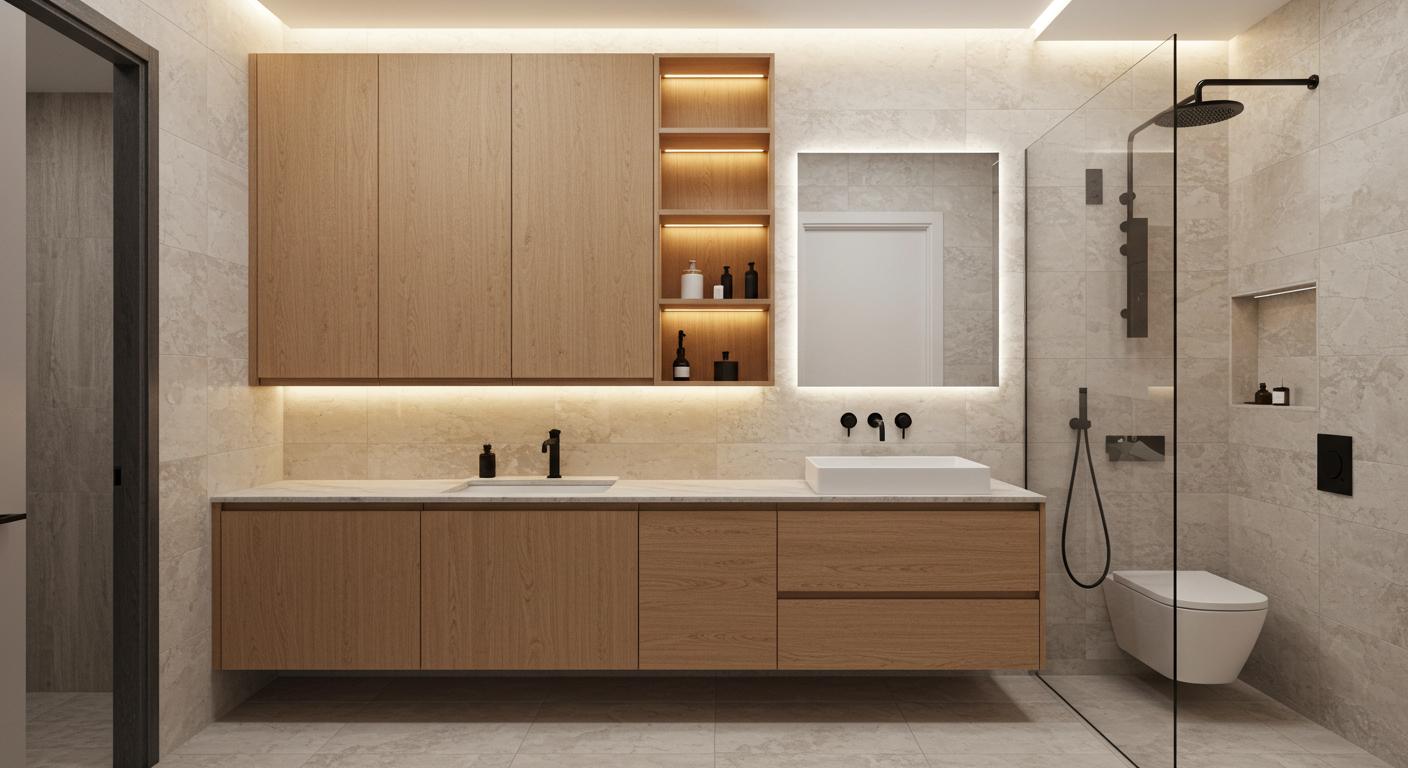
How To Hire The Right Bathroom Remodeling Contractor (Without Losing Your Mind)

Let’s be honest: remodeling your bathroom can feel a little like stepping into uncharted territory. You’re juggling design choices, costs, and permits—oh, and the possibility that someone might turn your cozy half-bath into a construction war zone.
But here’s the good news: the right contractor can make all the difference. And as someone who’s been knee-deep in demo dust and tile adhesive more times than I can count, I’m here to walk you through the process—step by step—with no jargon, no fluff, and absolutely no hard sell.
Let’s make sure your bathroom renovation is the dream you hoped for—not the nightmare you feared.
Why the Right Contractor Matters More Than You Think
Bathroom remodels aren’t like painting a bedroom or replacing cabinet handles. We’re talking plumbing, electrical, waterproofing, and structure—all packed into the smallest (and arguably most complex) room in your house.
Hiring the right contractor isn’t just about finishing the job. It’s about:
-
Getting it done safely
-
Avoiding cost overruns
-
Reducing stress and miscommunication
-
Protecting the value of your home
I’ve seen firsthand what happens when homeowners cut corners with shady or underqualified contractors. You don’t want to be the person calling in a second crew to fix what the first one messed up. It’s expensive. It’s frustrating. And it’s completely avoidable.
Step 1: Start With the Right Resources
So, where do you even start?
Most folks hit Google, but your search should go deeper than that. Here’s where I recommend looking first:
-
Referrals from friends or neighbors (especially if they’ve remodeled recently)
-
Local Facebook or Nextdoor groups
-
HomeAdvisor, Angi, or Houzz (read the reviews, but dig deeper)
-
Your city’s building department (they may have a list of licensed professionals)
Pro Tip:
Don’t just look for 5-star ratings. Read the reviews that talk about communication, timeline, and how issues were handled. A bathroom remodel rarely goes perfectly—but how a contractor handles those hiccups says everything.
Step 2: Check Credentials Like a Pro
This part matters more than most people realize.
Before you even ask for a bid, verify the contractor’s license and insurance. Every state has its own licensing requirements, and your contractor should meet or exceed them. You’ll also want to make sure they carry:
-
General liability insurance
-
Workers’ compensation (if they have employees)
-
Bonding (optional but adds peace of mind)
Here’s what I always tell clients: A good contractor won’t be offended if you ask about their credentials. In fact, they’ll be proud to show you.
Step 3: Interview Like a Boss
Set up calls—or better yet, in-person meetings—with at least three contractors. You’re not just comparing prices here. You’re interviewing someone who will be in your home for weeks, possibly months.
Ask:
-
How long have you been in business?
-
Can I see examples of similar projects?
-
What’s your estimated timeline?
-
Will you handle permits?
-
Who will be in my home every day—will you be onsite or sending subcontractors?
-
How do you handle unexpected costs or delays?
Anecdote:
I once worked with a homeowner who hired the cheapest bidder—only to find out later that the “team” was a revolving door of day laborers. The quality was inconsistent, and communication was a disaster. They ended up hiring someone else (me) to finish the job—at double the cost.
Step 4: Get It in Writing (Always)
The contract is your safety net. It should include:
-
Scope of work
-
Payment schedule
-
Timeline
-
Materials (brands, models, colors)
-
Warranty details
Even if you like the contractor and feel like you’re on the same page—write it down. Verbal agreements lead to misunderstandings.
Pro Tip:
Look for vague language like “Install fixtures provided by owner.” If your contractor doesn’t specify which fixtures or what labor is included, ask them to clarify before signing.
Step 5: Understand the Costs (and What You’re Really Paying For)
The national average for a midrange bathroom remodel is $11,500 in 2025, according to the Remodeling Magazine Cost vs. Value Report.
Here’s how that typically breaks down:
-
Labor: ~40%
-
Materials: ~35%
-
Overhead/markup: ~15%
-
Permits & inspections: ~10%
Get detailed estimates, not lump sums. If a contractor hands you a one-line bid for "$15,000 – complete remodel," ask for a breakdown. You have a right to understand where your money is going.
If your remodel includes new fixtures, consider using EPA-certified WaterSense products. They’re designed to reduce water usage without sacrificing performance—potentially saving you money long-term on utilities.
Step 6: Check Their Work (And Their Reputation)
Always ask for at least three references—and call them.
Don’t just ask if they were “happy with the work.” Ask:
-
Was the project finished on time?
-
Were there any budget surprises?
-
How was communication throughout?
And then, go see their past work if possible. Pictures help, but walking through a finished project tells you so much more. Tile lines, caulking, fixture placement—it all speaks volumes.
Step 7: Know What to Expect Once Work Begins
This part catches most homeowners off guard.
Here’s a basic timeline for a standard bathroom remodel:
-
Demolition – 1–2 days
-
Rough plumbing & electrical – 2–3 days
-
Inspection (if required) – 1–2 days
-
Drywall, flooring, tile – 5–7 days
-
Fixture installation & finishing – 2–4 days
Important:
There will be dust. There may be noise. And sometimes, a project runs long because a tile shipment is delayed or the subfloor needs more repair than expected.
That’s why choosing a contractor who communicates well is just as important as one with great technical skills.
Red Flags to Watch Out For
Keep your eyes open for:
-
Contractors who demand full payment upfront
-
Estimates that are way lower than others
-
Vague answers to direct questions
-
No physical address or license number
Trust your gut. If something feels off, it probably is.
Real Talk: DIY vs. Professional
Yes, you can remodel a bathroom yourself—but unless you’re experienced with plumbing and electrical work, I don’t recommend it for full renovations. You may save money upfront, but the risk of damage (and code violations) is real.
Here’s what I tell people:
If your project involves moving pipes, upgrading wiring, or installing a new tub or shower—you want a pro.
Conclusion: Trust Matters—So Work With a Contractor Who Respects Your Home
Hiring the right bathroom remodeling contractor isn’t just about getting the job done. It’s about working with someone you trust, someone who listens to you, respects your home, and stands behind their work.
That’s why I always recommend Equinox Builders for homeowners who want peace of mind from start to finish. With a team that combines craftsmanship with clear communication, they’ve earned a reputation for doing things the right way—the first time.
They don’t just remodel bathrooms—they restore confidence in the remodeling process.
Final Thought:
A bathroom remodel is a big deal. You deserve to feel confident about the people you’re inviting into your space. Ask questions. Read the fine print. And never settle for “good enough.”
If you take the time to find the right contractor, your only regret will be not doing it sooner.

